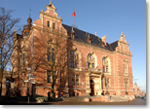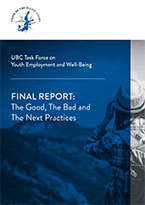Menu
Contact
Union of the Baltic Cities
Secretariat
Wały Jagiellońskie 1
80-853 Gdańsk Poland
tel. +48 58 301 09 17
tel. +48 58 301 91 23
fax +48 58 301 76 37
 Contact us
Contact us
Secretariat
Wały Jagiellońskie 1
80-853 Gdańsk Poland
tel. +48 58 301 09 17
tel. +48 58 301 91 23
fax +48 58 301 76 37
 Contact us
Contact us


The delegates of the 6th UBC General Conference in Rostock, Germany, October 13, have unanimously adopted the following resolution:
Taking into account
- The growing significance and broadened scope of co-operation between cities in the Baltic Sea Region, and the great achievements of the Union of the Baltic Cities to promote and co-ordinate this process during the first ten years of its existence;
- The Aalborg Charter on European Sustainable Cities and Towns, the European Sustainable Cities and Towns Campaign, and the newly established European Framework on Co-operation and the Platform for Urban Sustainability, and the importance of the involvement of cities in implementing the Agenda 21 for the Baltic Sea Region (Baltic 21);
- The significant role of municipalities in advancing social cohesion and the importance of the Social Charter of the Union of the Baltic Cities (Rostock 12-13 October 2001) in this respect;
- The important role the Council of Baltic Sea States (CBSS) today holds in the co-ordination of the regional intergovernmental, multilateral co-operation among the group of CBSS members, and the Priorities of the current Russian CBSS Presidency, especially the section on "Promoting practical interaction between CBSS and sub-national co-operation structures in the Baltic Sea Region, on the one hand, and the European Union on the other";
- The Northern Dimension as an important concept and tool for co-ordination and prioritising of actions in the Baltic Sea Region, especially the Action Plan for the Northern Dimension with external and cross-border policies of the European Union 2000-2003, adopted by the European Council in Freire, June 19-20 2000;
- The Communication (17 February 2001) from the European Commission to the Council on the European Union and Kaliningrad, especially the section on practical measures to conduct proper and efficient border control and facilitating the movement of persons and goods across the future external border;
- The Danish Government proposal at the CBSS Ministerial Session in Palanga 14-15 June 1999 on the Establishment of the Fund for Sub-regional Development in the Baltic Sea States as a complement to existing national and EU mechanisms, which was further discussed at the CBSS Ministerial Sessions in Bergen (21-22 June 2000) and Hamburg (7 June 2001), and elaborated at the expert meeting in Copenhagen on 24 September 2001 to prepare the functioning of the facility;
- The need for continued and deepened co-operation with other local authority organisations and networks active in, or relevant to, the Baltic Sea Region.
Emphasising the Importance of
- The local democracy and local level involvement for a sustainable democratic development;
- The role of local and regional authorities in implementing European and national level policies in various spheres;
- Successful enlargement of the European Union in the Baltic Sea Region;
- Support from the citizens for the enlargement in the candidate countries,
- NGO's and other civil society organisations in implementing people-to-people activities and as spokespersons for various interests.
Considering that
- Partnerships between public administrations are an effective and affordable method of providing technical assistance and expertise;
- While the EU created a comprehensive legislative and financial framework for the promotion of partnerships with the candidate countries' central governments in order to prepare them for membership, the regional and local authorities have so far not sufficiently been integrated in this process;
- The existing European support for sub-national institution-building aimed at strengthening regional and local authorities in the Central and Eastern European countries (e.g. Phare CBC, Interreg III C, the Phare Democracy Program, Phare Acess) is neither sufficient nor geared to the accession candidates' problems and needs at sub-national level.
Calls for:
- A better and goal-oriented involvement of the local authority level in the EU enlargement process through concrete co-operation activities between the European, National, Regional and the Local Government levels
- An enhanced dialogue between the European level, the UBC and other multilateral local and regional authority networks and organisations on the EU enlargement;
- Better support for co-operation activities between cities in the process of preparing the cities for a future EU membership;
- The implementation of the Danish Government proposal on the Establishment of the Fund for Sub-regional Development in the Baltic Sea States;
- Successful implementation of sustainable urban development and Agenda 21 in the Baltic Sea Region and Europe in co-operation between the local authorities, their networks and organisations, Baltic Sea Region States, and the European Communities;
- Better adaptation of various EU cross-border programs to the realities prevailing in the Baltic Sea Region, such as taking into account maritime borders, eligible actions and feasible project sizes;
- More effective co-ordination between Phare and the Structural Funds;
- Involvement of local and regional authorities and NGO's in the implementation of the Northern Dimension Action Plan;
- Baltic Cities to develop deeper and wider co-operation with civil society organisations and promote their networking with UBC and other Baltic partners.




